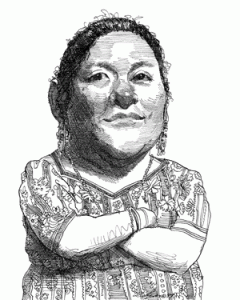 I always find it tremendously intriguing reading about heart-wrenchingly “heroic” or “life changing” stories because it just goes to show how much strife and hardship there is outside of my own relatively meek concept of a “life changing” event.
I always find it tremendously intriguing reading about heart-wrenchingly “heroic” or “life changing” stories because it just goes to show how much strife and hardship there is outside of my own relatively meek concept of a “life changing” event.
Rigoberta Menchú’s story is particularly captivating because you’re not abruptly attacked by raging misogyny or astonishing amounts of injustice- merely a subtle taste of racism, acute segregation, almost laughable disparities and the horrendously typical struggles of living in a 3rd world nation.
Before being attacked by my fellow colleagues by referring to disparities as “laughable”, let me clarify my phrasing. Disparities in certain 3rd world countries could be acknowledge as being laughable because of how blatantly apparent it is that a handful of the wealthier population could not care less. For instance, in Jakarta Indonesia, the Jakarta Intercultural School (J.I.S) is 46 acres of $43,000+ CAD (per year) worth of institution and right next to the football (soccer) field is area drenched in poverty.
The courage it took for Rigoberta to not only be a member of the driving force for social and mental emancipation within her community (that is before being exiled), despite the fact that her father was killed by the Guatemalan army (after being on their radar for a lengthy amount of time), one of her brothers were kidnapped and murdered and to top it all off, her mother was kidnapped, raped, tortured and murdered. However, travelling to a foreign country to tell her story, to someone who could have very well turned her away for being uneducated and poor is as inspiring as it was perceived idiotic.
The main concepts I gathered from reading the excerpts from “I, Rigoberta Menchú” is that there is an underlying battle between, I know my people are being unfairly treated and I want to be a part of the “elite” class (and to do so I need to learn to speak Spanish). However, I am also a woman in a 3rd world country in the middle of the 1960s (the civil war took place from 1960 to 1996 but Rigoberta was exiled in 1981) – Can I really encourage and be a part of the change I want to see?
Rigoberta’s story and receptor’s comments made me think of the question, “To what extent does revolution affect the concept of women being seen as “equal” but still “less than”?” By this I mean, Rigoberta was seen as an equal in the sense that she could lead her people the same way her father did. But, she is not a man, so she does not have the same impact he would have had. It is possible that her recollections of the Guatemalan civil war could be a “guerrilla-inspired Marxist fable”.
Works Cited:
“UBC Library Holdings Information”. Webcat1.library.ubc.ca. N.p., 2016. Web. 19 Sept. 2016.
“BBC NEWS | Africa | Britain’s Troubles With Mugabe”. News.bbc.co.uk. N.p., 2000. Web. 19 Sept. 2016.
Canby, Peter and David Stoll. “‘I, Rigoberta Menchu’”. The New York Review of Books. N.p., 1999. Web. 19 Sept. 2016.
Canby, Peter. “The Truth About Rigoberta Menchú”. The New York Review of Books. N.p., 1999. Web. 19 Sept. 2016.
Hans Rosling’s 200 Countries, 200 Years, 4 Minutes – The Joy Of Stats – BBC Four. 2016. Web. 19 Sept. 2016.
“Mugabe Inauguration: New Era Or Back To Old Days? – BBC News”. BBC News. N.p., 2016. Web. 19 Sept. 2016.
“Reducing Inequality In Indonesia”. World Bank. N.p., 2016. Web. 19 Sept. 2016.
Work, How et al. “Rigoberta Menchú Tum – Nobel Women’s Initiative”. Nobel Women’s Initiative. N.p., 2016. Web. 19 Sept. 2016.